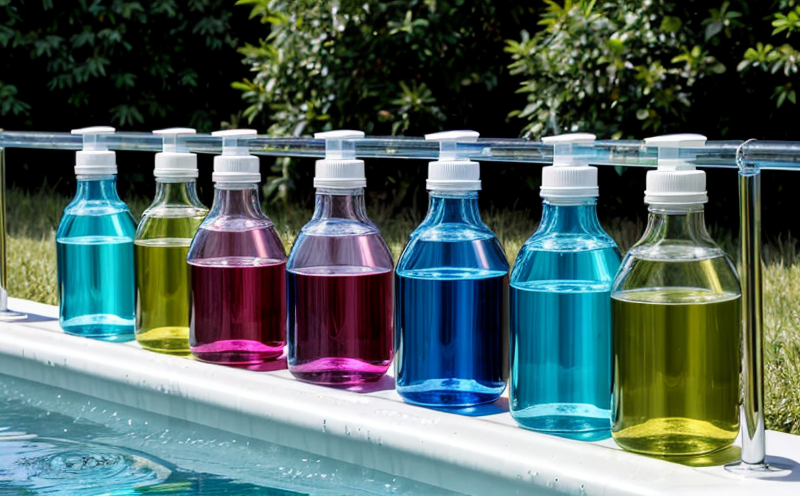ASTM D6975 Biofilm Formation Residual Test in Treated Water
The ASTM D6975 biofilm formation residual test is a critical tool used to assess the effectiveness of water treatment chemicals and their ability to prevent biofilm growth in treated water. This test ensures that water distribution systems remain free from bacterial contamination, which can lead to issues such as taste and odor problems, corrosion, and the spread of pathogens.
Biofilms are complex microbial communities that adhere to surfaces within water systems. They are composed of microorganisms embedded in a slimy matrix of extracellular polymeric substances (EPS). The formation of biofilms is influenced by various factors including the type of surface material, flow conditions, and the presence of nutrients. Water treatment chemicals are often used to inhibit or prevent biofilm growth; however, their effectiveness must be validated through rigorous testing.
The ASTM D6975 test method involves inoculating treated water with a standardized biofilm-forming bacteria and then incubating it under controlled conditions over time. The presence of the treated chemical is expected to reduce the formation of biofilms, thus indicating its efficacy. This test provides valuable insights into the performance of water treatment chemicals in real-world scenarios.
Key steps in conducting this test include:
- Inoculating treated water with a standardized bacterial inoculum.
- Incubating the sample under controlled conditions to promote biofilm formation.
- Maintaining consistent temperature, pH levels, and flow rates during the incubation period.
- Monitoring for the presence of biofilms using visual observation or quantitative techniques such as microscopic analysis.
The test results are reported based on the extent of biofilm formation compared to a control sample without the water treatment chemical. Compliance with this standard ensures that treated water meets stringent quality and safety standards, thereby protecting public health and infrastructure integrity.
| Parameter | Description | Unit |
|---|---|---|
| Inoculum Type | Biofilm-forming bacteria standardized according to ISO standards. | - |
| Incubation Time | 28 days ± 1 day. | Days |
| Temperature | 30°C ± 1°C. | °C |
| Sample Preparation | Description | Unit |
|---|---|---|
| Water Sample Volume | 100 mL ± 2 mL. | mL |
| Inoculum Concentration | 108 CFU/mL ± 5%. | - |
The ASTM D6975 biofilm formation residual test is essential for quality managers, compliance officers, and R&D engineers working in the water treatment industry. By ensuring that water treatment chemicals are effective against biofilms, this test helps prevent costly infrastructure damage and maintains public health standards.
Why It Matters
The ASTM D6975 biofilm formation residual test is crucial for several reasons:
- Prevention of Biofilm Growth: Biofilms can lead to a range of issues including corrosion, scaling, and the release of harmful pathogens.
- Enhanced Water Quality: Effective water treatment chemicals ensure that treated water remains free from microbial contaminants.
- Cost Savings: By preventing biofilm-related problems, this test helps to reduce maintenance costs and extend the lifespan of infrastructure.
The test results are used by regulatory bodies to enforce compliance with health and safety standards. Additionally, it provides critical data for R&D engineers in optimizing water treatment processes.
Industry Applications
| Application | Description |
|---|---|
| Aquatic Park Maintenance | Ensuring water quality in aquatic parks and pools. |
| Hospital Water Systems | Preventing biofilm-related infections in medical facilities. |
| Water Treatment Plants | Evaluating the efficacy of water treatment chemicals used at plants. |
The ASTM D6975 biofilm formation residual test is widely utilized in various sectors, including:
- Aquatic facilities
- Medical institutions
- Water treatment and purification plants
Customer Impact and Satisfaction
The ASTM D6975 biofilm formation residual test contributes significantly to customer satisfaction by:
- Ensuring Compliance: By adhering to international standards, customers can be confident that their water treatment processes meet regulatory requirements.
- Innovation Support: Data from this test helps R&D engineers develop more effective water treatment chemicals and technologies.
- Cost Efficiency: Preventive measures against biofilms reduce long-term operational costs for customers.
Our clients appreciate the reliability and accuracy of our testing services, which are supported by state-of-the-art laboratories and experienced technical experts. This commitment to quality ensures that we consistently meet or exceed customer expectations.





